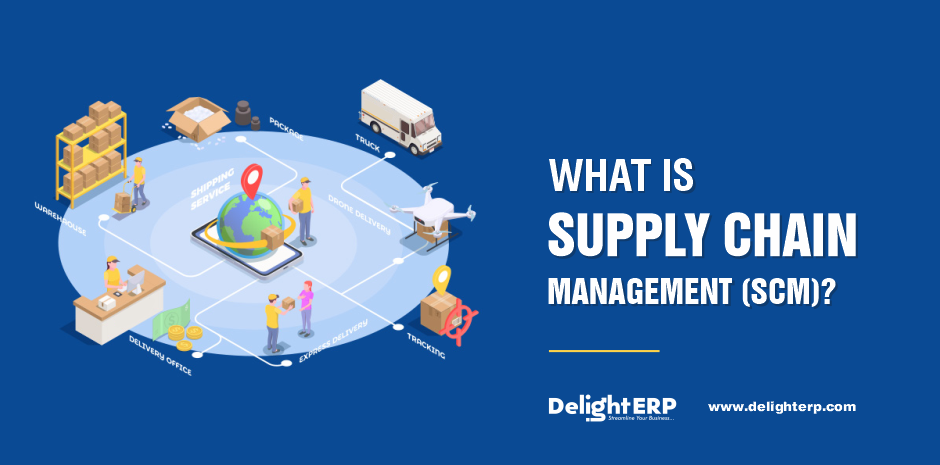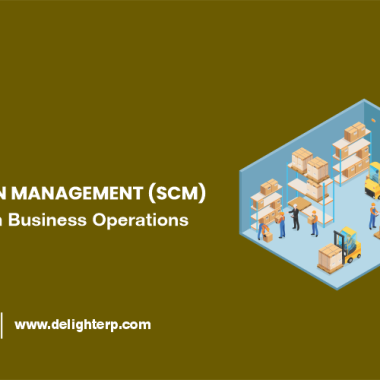Introduction
Supply chain management is the activity to manage the supply chain activities to increase the customer and maximize the profits.
Companies handle the whole production process, starting from the raw components to delivering the final product to the customers. The SCM is an essential part of every company and helps businesses to reach success.
Manufacturing industries have to do their production on time and supply their material on time. They have to manage everything properly. If companies aren’t able to deliver the products on time then it makes a negative impact on the consumers. They use the supply chain management software because companies have to deliver the material on time.
Supply chain management monitors the production process to supply material. By managing the supply chain companies minimize the cost expenses and deliver the products to the consumers fast or on time.
A supply chain is an activity that gathers the network of resources and technology to sell the products or services. This process starts with the manufacture of the raw material into the products and ends with the products delivered to the customers.
Supply chain management is the software that manages the supply chain of the companies or industries. It helps the companies to maintain their process of production and delivery done by the given time.
How does supply chain management work?
Businesses gain more customers’ trust in the products then businesses increase their profits. They also manage their cost because businesses increase their profits when the sales ratio is high and the cost ratio is lower than the sales ratio.
In today’s market, there is various software available to manage the supply chain. The supply chain system is used by the manufacturing industries to deliver the products or services to the customer.
There are basic components of SCM which are used by the production industries.
1. Planning
Planning is a major component for the SCM, through this company makes plans and manages the resources as per the customer demand. When the supply chain is established, determine the bar to measure whether the supply chain is effective, delivers products to customers, and meets company goals.
2. Sourcing
For production businesses need raw materials with low cost and good quality. Industries need the source through which they got the material for the manufacturing. Through the help of SCM, companies can manage the relationship between the companies and sources also, manage the inventory, and invoice payment for suppliers.
3. Making
Manufacturing industries have to follow the steps of the production process like reviewing and accepting material, product manufacturing, quality testing, and packaging of the products. SCM helps the industries to coordinate the step in sync and make a proper schedule to deliver the products to the destination at the deadline.
4. Delivery and Logistics
Another component of SCM is the delivery and logistics of the products, after manufacturing the products. The production of the product is done then companies need to deliver the products to their destination. Supply chain systems help the industries to manage and properly schedule the order and delivery to their destination at the given time.
5. Returning
In several cases, companies may include scrapping or reproducing the defective products. Through this component of SCM, companies can provide the best customer services. Maintaining the relationship with the consumer is most important for every business. After purchasing the products companies provide the solution for the customer problems.
Through these components, companies can manage their Supply Chain easily and are able to provide the best customer services.
Importances of supply chain management
There are various reasons to select the supply chain system in the manufacturing industries. Following importance for use of the supply chain management in the companies.
-> Identified possible problems
Product manufacturing industries faced various problems, sometimes customers ordered the products more than the raw materials. Through the SCM companies analyzed the shortage of the material before taking orders from the consumers. Suppose a customer gives the order for a large number of the products and companies didn’t have enough raw materials then they order the raw materials or take the limited orders from the consumers.
-> Optimizing price dynamically
Seasonal products are only sold out during their seasons. After the season’s companies faced difficulty selling the products, so they sold the products at a discount rate. But make the margin of the products carefully, if they never increased their profit ratio but they didn’t increase their cost ratio.
SCM has a future to analyze the gap between the cost and the price of the products. Also, help the companies to increase their profits.
-> Reduce the operating cost
With the help of the SCM, companies can reduce the operating cost of the companies and maximize profits. Operating costs like employee salary, insurance, bills, emergency cost, etc.
-> Maintain cash-flow
Cash flow is important for every business or company. Through the help of the SCM, businesses can maintain the cash flow positively. Also, positive cash flow helps the investors, financial, or consumers to build their trust in the companies.
-> Increased revenue
Every business or organization has only one goal to increase their revenue with customer satisfaction. SCM through businesses monitors the whole supply chain. They monitor the raw material, and another cost as well, if the cost is lower than the profits then companies increase their revenue.
Manufacturing industries increased their sales ratio and provided the material by a given time with the help of Supply chain management.
Also Read: What Is Manufacturing ERP Software?
Features Of SCM
Supply Chain Management software has various features for the companies. Here, some key features of the SCM for the companies or businesses.
-> Connected
The software is connected to the whole process of manufacturing products. Also, the software is connected to social media to promote their products on the digital platform. The whole production process is working as per the schedule and connecting with other work that’s why companies or businesses can minimize their workload.
-> Collaborative
SCM is collaborative software for the manufacturer. The software helps the manufacturer to collaborate with the employee and distribute the task as per the schedule and complete the production on time.
-> Cyber-aware
Every system or software which is accessed by the internet has to be protected from the hacker and the virus. Most Supply management systems are secure from virus attacks or hackers and protect the data and provide security to the businesses.
-> Process optimized
Through the system, companies can optimize the process of manufacturing. SCM helps the companies to provide the facility to get the overview of the production to utilize the time and update the schedule as per schedule the companies complete the production at the deadline.
-> Forecasting
The system stores the day-by-day data regularly and helps the business to watch the updated process. Through the forecasting reports of the process help to complete the production as per the schedule.
-> Customization
Companies change their rule, as per the change they have to be aware of their updated rule to the employee and consumers. Through software companies provide customized solutions to their consumers regarding customer services and products.
These features help the companies to grow day by day and reach their goal in the competitive market. Companies also got success by their positive impact on the consumers.
Conclusion
Supply Chain Management helps the manufacturing industries to reach success by supplying their material before the deadline and make a good impact on the consumer. Not only that, but industries also distribute the work to the employees to minimize the workload of the companies for helping them to boost their revenues. Companies make quick decisions regarding the products and gain the trust of new customers by maintaining the cash flow.





